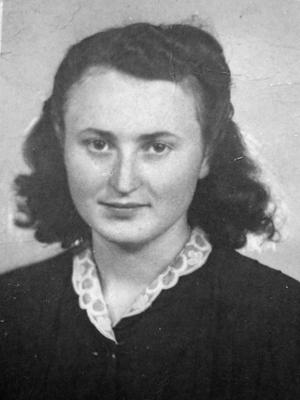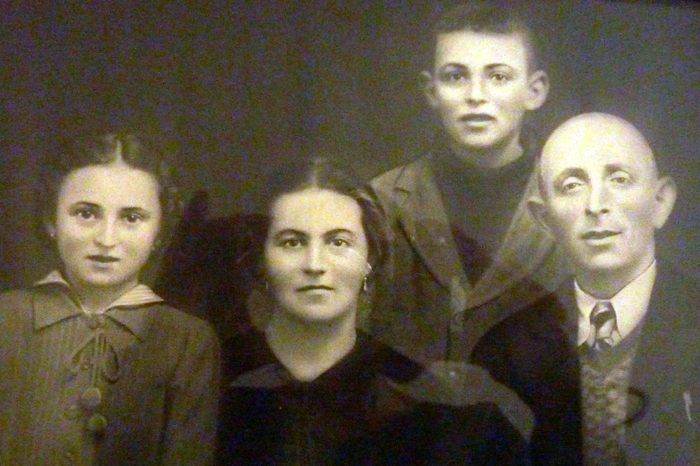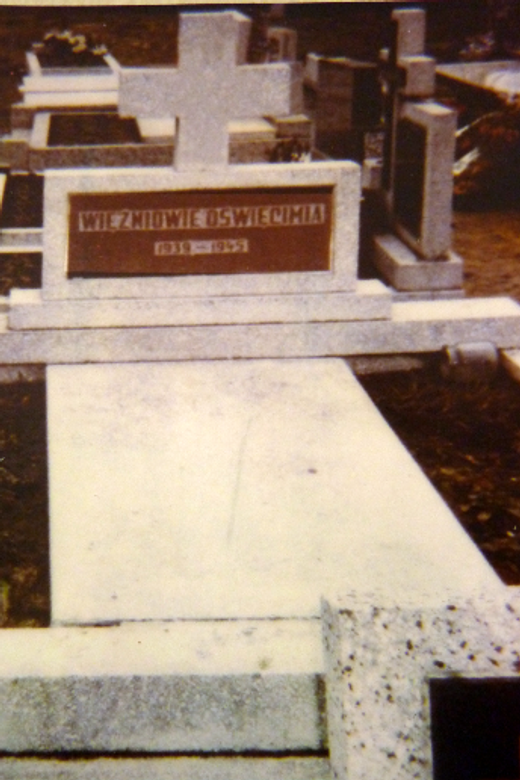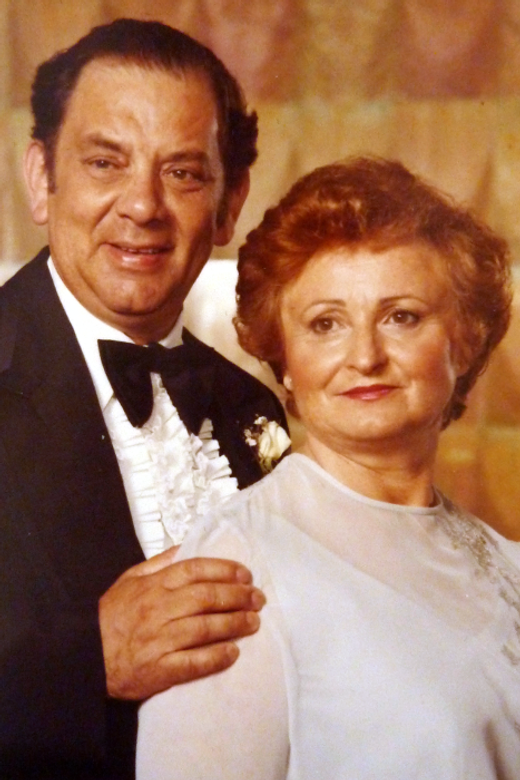Irene Gray

Born: Munkács, Czechoslovakia (now Mukachevo, Ukraine), 1927
Wartime experience: Hiding, ghetto and camps
Writing partner: Bluma Teram
Irene Gray was born in Munkács, Czechoslovakia (now Mukachevo, Ukraine), in 1927. Her family owned a winery in Munkács, and she spent an idyllic childhood there until the area came under Hungarian occupation.
In April 1944, one month after the German occupation of Hungary, the Jews of Munkács were forced into a ghetto. Irene and her family initially hid in a bunker on their property and later at a neighbour’s winery. As hiding became more dangerous, they snuck into the ghetto, from which they were deported in cattle cars to Auschwitz-Birkenau. After about three months in Birkenau, Irene was selected to work at the Krupp munitions factory at the Wüstegiersdorf forced labour camp. After being liberated by the Soviets, Irene recovered in a hotel in the Tatra Mountains and eventually reunited with her brother, Andy, her only immediate family member to have survived the war. In early 1948, Irene met her future husband, Nathan Grajcar, in the Bergen-Belsen displaced persons camp. In the spring of 1948, Irene sailed with her brother to Canada, settling in Toronto, where she was later joined by Nathan. They married in 1949 and raised two children.
Life in Munkács Before the War
Most Jews in the region were poor. They worked in manual and farm labour and lived in small towns and rural villages. People in the larger places, such as the cities of Munkács (now Mukachevo, Ukraine) or Ungvár (now Uzhhorod, Ukraine), made a living by working in the trades and running small businesses, but many were unable to earn a good living. Monday was a very busy day in Munkács, as the peasants from all the surrounding villages brought in their goods and sold things like vegetables, geese, shoes and other items in an open market behind the city centre.
Munkács, the biggest and most important Jewish community in the region, was known for its rabbis, Hasidim, Jewish religious life and Zionist activity. Between the two world wars, the Jewish community was very active. We had Yiddish newspapers, a chevrah kadisha (Jewish burial society), organizations to help the poor and sick, kosher foods and celebrations of the Jewish holidays. Stores were closed on Shabbat, the Sabbath. After shul, synagogue, people walked the streets in their Hasidic clothes. Each Friday night and Saturday morning, all the young people, dressed in their best Saturday clothes, strolled up and down the main street, the Corso, which was where people met each other and had a very good time.
Although Munkács was a Hasidish city, meaning Hasidic or religiously orthodox, my family was considered modern, and my father didn’t have a beard or wear a kippah, a skullcap. Like everyone else, we attended religious services on holidays and Shabbat, as that was the very least a Jew could do in Munkács, and my father often supplied the wine for the Kiddush. My grandparents owned two lifetime seats at the main shul, and when my grandmother died my mother inherited her seat. On Yom Kippur, my mother stayed in shul for the day, and I would visit with her a couple of times during the day, but my task was to set the dinner table and heat the food for the evening break fast.
Zionism and Hasidism lived side by side in Munkács but were often at odds with each other. My father was a Zionist and sent us to Hebrew school to learn Hebrew and English. He also sent his sister and her five children to British Mandate Palestine in 1933. Some religious Jews in Munkács boycotted our kosher wine because my brother, Andy, and I attended a Zionist Hebrew school, but most people didn’t mind and still bought our wine.
On Wednesday and Thursday evenings, a boy who studied at the yeshiva, a school where students studied the Jewish texts, ate lunch at our house, and my mother prepared sandwiches for him take home for his evening meal. Like everyone else, we were happy to feed a yeshiva bochur, a young boy who studied at the yeshiva. He came from a village to study with the rabbis and didn’t have family in the city. Every Thursday and Friday, many poor Jews also came to Munkács for help, and my mother kept a pushke, a charity box, for them; she always honoured their request for leftover food.
The Jews of Munkács and Ungvár were close and often intermarried. For example, Ida, my mother’s mother, came from Ungvár, and Ignatz, my mother’s father, came from Munkács. My grandmother was a wigmaker and successful business person. Wig making in a Hasidic city was profitable, and she was able to hire several employees. My grandfather also ran a business. He owned a large dry goods store until he suffered a stroke and had to retire. Although I was young at the time, I remember that he liked me very much and would take me for walks.
My parents owned a large, beautiful winery, and during school holidays and summers we spent our time there at the chalet; it was just like going to a summer cottage. Sometimes my friends visited us at our winery, which was full of lovely fruit trees. The winery wasn’t far from our home, and we could walk there in about one and a half hours, although like many men, my father rode a bicycle to work. When the orchards were ripe with fruit, I always hoped for a storm to blow so that the fruit would fall to the ground and the morning after I could grab my basket to gather it all up.
The winter brought lots of snow, and Andy and I often went tobogganing and skating with our friends at the various skating rinks around Munkács. One year I received a pair of ice skates as a Chanukah gift, but in those days the blades weren’t attached to a boot — we had to screw the blades onto our everyday shoes. On Saturday afternoons during the winter, a few of my friends and I played Monopoly, a new game the father of one of my friends had brought from New York. We played together in the warm kitchen, where it was so cheerful and fun to be together.

Irene (left) at ten years old with her parents, Freda and Herman Tuvel, and her brother, Andy (in back). Munkács, Czechoslovakia, circa 1938.

Irene (front row, sixth from the left) in her class photo from Hebrew elementary school. Munkács, circa 1938.
Under New and Brutal Regimes
The first time I felt the effects of antisemitism was when my friend Susan’s family invited me to join them at a country club where her father worked as an engineer. The club prohibited Jews from membership or entry and I felt very uncomfortable.
When the Hungarian army came to Munkács in November 1938, it didn’t take long to find out just how antisemitic the Hungarians were. They forced Jewish children to leave the public schools and many of them came to our school to continue their studies. They officially closed the Gymnasium, what we called a public school, and re-opened it in 1939, changing the name to the Jewish School, and they refused Jews entry to the university. They threw us out from our school building, the building that had been built and paid for by my father and other people in our community. After all these changes and discriminatory actions, many of the elementary and high school teachers left for British Mandate Palestine.
The Hungarian gendarmerie was brutal. The Germans could not have succeeded without the collaboration of the Hungarian gendarmerie, which treated Jews with terrible cruelty. Their violence was sometimes worse than the Nazi violence, which was to come later. The Hungarian gendarmerie, in search of jewellery and gold, forced their way into Jewish homes, threw the families out, stole their property and destroyed their homes. People were too afraid to walk in the streets because they could be grabbed and beaten, as my father was.
The Germans arrived in Prague in 1939. My father received terrifying letters from my uncles who were practising medicine and dentistry in Prague. They begged my father to send them documents proving their Hungarian citizenship, stating that they were born in Munkács. My uncles explained that without this evidence, they would be sent to Theresienstadt. It was terrible: they begged and begged him. My father succeeded in getting the necessary documents but all the paperwork didn’t help. After a while, we stopped hearing from them. It was quiet and we knew they had been sent to the camps. We never heard from them again.
***
In the spring of 1944, the Hungarian gendarmerie loaded between seventy and one hundred people into a cattle car, which was surrounded with wire. It was horribly crowded. There was no air to breathe, and we were only able to sit in a fetal position. The train didn’t stop, and we had no food, water or sanitation for three days. There was a little opening in the wall of the cattle car, and when it started to rain people who were closest to that opening stuck their fingers out to lick the rainwater off their fingers. I thought that if I could just get closer to the opening I too could stick my hand out to catch some rain.
Nobody knew our destination. I found out later that of the nearly one hundred people in the cattle car all were sent directly to the gas chambers; only Andy and I were selected to work in labour camps and survived.
We saw people dressed in striped clothes who looked like zombies. These Jewish inmates had been in Auschwitz-Birkenau for years and didn’t talk. They didn’t even look at us and made no eye contact. When we asked them what was happening, they said nothing, even though they knew exactly what was going on. All they did was push us out of the cattle cars as they collected any belongings that were scattered there.
After we got out of the cattle cars, we waited for someone who I later heard called the Angel of Death, Josef Mengele. Mengele, as did many other SS personnel, selected people to go to the right or to the left. My age, seventeen, was close to the cut-off — people younger than sixteen were considered children and were murdered, and the Germans got rid of most boys who were younger than fifteen years old because they weren’t considered strong enough for work, or they most probably died in the camp of hunger and disease.
I had been holding my mother’s hand when a German soldier pushed me away from her and sent me to the right. The younger women were sent to the right. My mother was sent with the older people and children to the left. I walked in the direction of the showers and when I turned around and looked at my mother, she was walking in the other direction. I didn’t know that was the last time I would see her.
***
One morning in the summer of 1944, as we were being counted, a small man came into the camp with Mengele. He was there to select girls to work in the Krupp munitions factory. I don’t know why he looked at our feet and legs, but I was standing in the front and was among the first girls selected, along with one girl from my school. Out of approximately 30,000 young women, he chose about two hundred of us. Immediately after we were selected they separated us from everyone else and made us stand outside all night long. In the morning we were sent by cattle car to Wüstegiersdorf, where there was a forced labour camp that included a camouflaged underground factory that produced munitions and bombs. Conditions there were inhumane.
We worked a twelve-hour shift starting at six in the morning and ending at six in the evening. When we returned to the barracks at night, we were given our only meal, which consisted of watered-down soup. We were constantly hungry.
As we marched through a German village from the barracks to the munitions factory, we were guarded by SS men with their pistols and dogs. German villagers claimed they never saw us and knew nothing about what was happening. The truth is they could not possibly have pretended to not see us because we were right there in front of their eyes. They saw us every day, twice a day.
My mother was sent with the older people and children to the left. I walked in the direction of the showers and when I turned around and looked at my mother, she was walking in the other direction. I didn’t know that was the last time I would see her.
Mixed Emotions
At some point, we were locked up in the barracks for three days with no food or knowledge of what was happening. We had no idea that the Germans had run away and the war was over. Finally, a Soviet soldier came, opened the door and then the gate, and told us that we were free to go. We had mixed emotions, as we were happy and sad at the same time. We walked out of the barracks and through the gate, but we had no home, no family, nowhere to go, and we were frightened of being shot. We asked the Soviet soldiers what we should do and where we should go. One soldier warned us that it was too dangerous to go east to Poland or Hungary, explaining that the Poles and Hungarians wanted to keep our houses and possessions and we could be shot if we returned. This was the beginning of a long struggle to find our way somewhere to be on this earth.
I walked down the hill toward a men’s camp not too far from our camp. There were dead bodies lying everywhere in ditches. I saw an emaciated man who looked dead, but he opened his eyes, turned his head to look at me and asked for my help. I was so scared, and I couldn’t help him. His face has haunted me ever since, and will continue to haunt me.
***
It was safer to travel in groups, and some of us travelled to Czechoslovakia together. We were very weak, tired and hungry. I weighed about seventy-five pounds. On our way, we met a man who suggested that we might want to go to the Tatras. The Tatra Mountains in Slovakia had a beautiful hotel that, before the war, only the rich could afford. He told us that at the hotel we would be given food and medical care, which we badly needed because most of the girls suffered from tuberculosis and other illnesses, and we were all in very bad physical condition. We decided to go to the Tatras, where we were fed and treated well; the doctors checked our lungs for TB, and we were able to gather a bit more energy. After the war, my whole body was covered with black and blue bruises, and I had to be hospitalized. The bruising was so bad that one doctor asked me whether I had been beaten. Some of the bruising was due to my wounds, and malnutrition may also have been a factor, but there were many reasons for how I looked.

Silent Pain
While in Vienna, on New Year’s Eve, someone offered Andy, two friends and me tickets to attend an opera. For me, it was horrible to see German and Austrian women arrive at the opera wearing mink coats and jewellery, and the men wearing tuxedos. These women’s husbands, brothers, fathers, may all have been SS officers. After the horror that had been inflicted on so many people such a very short time ago, it was too painful to watch them. For these Austrians and Germans, it was as though nothing had ever happened, while we had to hide in our shmattes, rags, as they paraded in their fine clothes. Witnessing this sickening sight was one of the worst days of my life. We were angry, and it was too cruel. If we had attended this opera several years later, it might have been bearable, but this incident happened only weeks after we had crawled out of hell. We had not believed there was life outside of our barracks, and here we were, spectators of opera and mink coats. We hadn’t realized how much this spectacle would bother us, but we couldn’t take it, so we left without hearing the opera.
In May 1948, Andy and I landed in Halifax, Canada. From the port we were put on trains leaving for either Montreal or Toronto. It was unbelievable, but as I looked out of the window during our two-day train trip, I didn’t see a city, a village or any people, and it felt like we had come to a wasteland. When you travel in Europe, every ten minutes there is a village or town or at least something, so we were surprised that Canada seemed empty, like the moon, until we arrived in Montreal. In Montreal, we were asked whether we wished to stay there or continue on to Toronto. We chose Toronto, since we didn’t speak French and thought it would be easier for us to start a new life in Toronto. I spoke English and knew that when Nathan came, he would be able to learn English quite quickly. We had landed in a new and different country with no agencies to help or guide us. When we left Bergen-Belsen, we had each been given two dollars, and so with a total of four dollars we started to rebuild our lives. We were very grateful to be living in Canada.
At that time people didn’t want to talk about, know about or even think about the Holocaust. When we came to Toronto, it was as though we had arrived from Mars. People looked at us suspiciously, and we never really talked about anything that had happened to us because we never thought people could understand us. We both carried our pain and scars silently.
***
Decades after the war, the Hungarian government decided to compensate Jewish Holocaust victims living outside of Hungary. I applied and sent a copy of my report card with the application form. The officials responsible for compensation were totally amazed and couldn’t believe that I had kept the report card since 1942. I received one thousand dollars right away — can you believe it? One thousand dollars for all that had happened?
A few years ago I spoke with someone at the National Archives of the Czech Republic in Prague and asked them to find out what had happened to my mother’s brothers. After I provided them with the requested documents, including a document that had my father’s signature proving his ownership of our buildings, they found that in 1941, Drs. Ornstein (David, Hugo and Eugene) were sent to Theresienstadt and then deported to Auschwitz. I arranged a memorial for each of them at Yad Vashem.
Hitler focused more on killing the Jews of Europe than winning the war. Unfortunately, he succeeded in killing most of the Jews of Europe, but luckily he lost the war. In spite of everything, some of us Holocaust survivors are here to tell the story of the horrible atrocities that we endured during his rise to power. Today, as we witness a rise in antisemitism in Europe and in other parts of the world, I believe that the world has not learned the lessons from the Holocaust, and this remains a great worry for the Jewish people. What happened will be known and not forgotten, and should never happen again.


